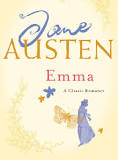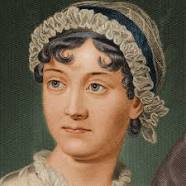Emma Page #33
Emma, by Jane Austen, is a novel about youthful hubris and the perils of misconstrued romance. The story takes place in the fictional village of Highbury and the surrounding estates of Hartfield, Randalls, and Donwell Abbey and involves the relationships among individuals in those locations consisting of "3 or 4 families in a country village". The novel was first published in December 1815 while the author was alive, with its title page listing a publication date of 1816. As in her other novels, Austen explores the concerns and difficulties of genteel women living in Georgian–Regency England; she also creates a lively comedy of manners among her characters and depicts issues of marriage, gender, age, and social status.
Mr. Weston, with triumph of a different sort, was confessing that he had known it to be snowing some time, but had not said a word, lest it should make Mr. Woodhouse uncomfortable, and be an excuse for his hurrying away. As to there being any quantity of snow fallen or likely to fall to impede their return, that was a mere joke; he was afraid they would find no difficulty. He wished the road might be impassable, that he might be able to keep them all at Randalls; and with the utmost good-will was sure that accommodation might be found for every body, calling on his wife to agree with him, that with a little contrivance, every body might be lodged, which she hardly knew how to do, from the consciousness of there being but two spare rooms in the house. “What is to be done, my dear Emma?--what is to be done?” was Mr. Woodhouse's first exclamation, and all that he could say for some time. To her he looked for comfort; and her assurances of safety, her representation of the excellence of the horses, and of James, and of their having so many friends about them, revived him a little. His eldest daughter's alarm was equal to his own. The horror of being blocked up at Randalls, while her children were at Hartfield, was full in her imagination; and fancying the road to be now just passable for adventurous people, but in a state that admitted no delay, she was eager to have it settled, that her father and Emma should remain at Randalls, while she and her husband set forward instantly through all the possible accumulations of drifted snow that might impede them. “You had better order the carriage directly, my love,” said she; “I dare say we shall be able to get along, if we set off directly; and if we do come to any thing very bad, I can get out and walk. I am not at all afraid. I should not mind walking half the way. I could change my shoes, you know, the moment I got home; and it is not the sort of thing that gives me cold.” “Indeed!” replied he. “Then, my dear Isabella, it is the most extraordinary sort of thing in the world, for in general every thing does give you cold. Walk home!--you are prettily shod for walking home, I dare say. It will be bad enough for the horses.” Isabella turned to Mrs. Weston for her approbation of the plan. Mrs. Weston could only approve. Isabella then went to Emma; but Emma could not so entirely give up the hope of their being all able to get away; and they were still discussing the point, when Mr. Knightley, who had left the room immediately after his brother's first report of the snow, came back again, and told them that he had been out of doors to examine, and could answer for there not being the smallest difficulty in their getting home, whenever they liked it, either now or an hour hence. He had gone beyond the sweep--some way along the Highbury road--the snow was nowhere above half an inch deep--in many places hardly enough to whiten the ground; a very few flakes were falling at present, but the clouds were parting, and there was every appearance of its being soon over. He had seen the coachmen, and they both agreed with him in there being nothing to apprehend. To Isabella, the relief of such tidings was very great, and they were scarcely less acceptable to Emma on her father's account, who was immediately set as much at ease on the subject as his nervous constitution allowed; but the alarm that had been raised could not be appeased so as to admit of any comfort for him while he continued at Randalls. He was satisfied of there being no present danger in returning home, but no assurances could convince him that it was safe to stay; and while the others were variously urging and recommending, Mr. Knightley and Emma settled it in a few brief sentences: thus-- “Your father will not be easy; why do not you go?” “I am ready, if the others are.” “Shall I ring the bell?” “Yes, do.” And the bell was rung, and the carriages spoken for. A few minutes more, and Emma hoped to see one troublesome companion deposited in his own house, to get sober and cool, and the other recover his temper and happiness when this visit of hardship were over. The carriage came: and Mr. Woodhouse, always the first object on such occasions, was carefully attended to his own by Mr. Knightley and Mr. Weston; but not all that either could say could prevent some renewal of alarm at the sight of the snow which had actually fallen, and the discovery of a much darker night than he had been prepared for. “He was afraid they should have a very bad drive. He was afraid poor Isabella would not like it. And there would be poor Emma in the carriage behind. He did not know what they had best do. They must keep as much together as they could;” and James was talked to, and given a charge to go very slow and wait for the other carriage. Isabella stept in after her father; John Knightley, forgetting that he did not belong to their party, stept in after his wife very naturally; so that Emma found, on being escorted and followed into the second carriage by Mr. Elton, that the door was to be lawfully shut on them, and that they were to have a tete-a-tete drive. It would not have been the awkwardness of a moment, it would have been rather a pleasure, previous to the suspicions of this very day; she could have talked to him of Harriet, and the three-quarters of a mile would have seemed but one. But now, she would rather it had not happened. She believed he had been drinking too much of Mr. Weston's good wine, and felt sure that he would want to be talking nonsense. To restrain him as much as might be, by her own manners, she was immediately preparing to speak with exquisite calmness and gravity of the weather and the night; but scarcely had she begun, scarcely had they passed the sweep-gate and joined the other carriage, than she found her subject cut up--her hand seized--her attention demanded, and Mr. Elton actually making violent love to her: availing himself of the precious opportunity, declaring sentiments which must be already well known, hoping--fearing--adoring--ready to die if she refused him; but flattering himself that his ardent attachment and unequalled love and unexampled passion could not fail of having some effect, and in short, very much resolved on being seriously accepted as soon as possible. It really was so. Without scruple--without apology--without much apparent diffidence, Mr. Elton, the lover of Harriet, was professing himself her lover. She tried to stop him; but vainly; he would go on, and say it all. Angry as she was, the thought of the moment made her resolve to restrain herself when she did speak. She felt that half this folly must be drunkenness, and therefore could hope that it might belong only to the passing hour. Accordingly, with a mixture of the serious and the playful, which she hoped would best suit his half and half state, she replied,
Translation
Translate and read this book in other languages:
Select another language:
- - Select -
- 简体中文 (Chinese - Simplified)
- 繁體中文 (Chinese - Traditional)
- Español (Spanish)
- Esperanto (Esperanto)
- 日本語 (Japanese)
- Português (Portuguese)
- Deutsch (German)
- العربية (Arabic)
- Français (French)
- Русский (Russian)
- ಕನ್ನಡ (Kannada)
- 한국어 (Korean)
- עברית (Hebrew)
- Gaeilge (Irish)
- Українська (Ukrainian)
- اردو (Urdu)
- Magyar (Hungarian)
- मानक हिन्दी (Hindi)
- Indonesia (Indonesian)
- Italiano (Italian)
- தமிழ் (Tamil)
- Türkçe (Turkish)
- తెలుగు (Telugu)
- ภาษาไทย (Thai)
- Tiếng Việt (Vietnamese)
- Čeština (Czech)
- Polski (Polish)
- Bahasa Indonesia (Indonesian)
- Românește (Romanian)
- Nederlands (Dutch)
- Ελληνικά (Greek)
- Latinum (Latin)
- Svenska (Swedish)
- Dansk (Danish)
- Suomi (Finnish)
- فارسی (Persian)
- ייִדיש (Yiddish)
- հայերեն (Armenian)
- Norsk (Norwegian)
- English (English)
Citation
Use the citation below to add this book to your bibliography:
Style:MLAChicagoAPA
"Emma Books." Literature.com. STANDS4 LLC, 2025. Web. 10 Jan. 2025. <https://www.literature.com/book/emma_29>.




Discuss this Emma book with the community:
Report Comment
We're doing our best to make sure our content is useful, accurate and safe.
If by any chance you spot an inappropriate comment while navigating through our website please use this form to let us know, and we'll take care of it shortly.
Attachment
You need to be logged in to favorite.
Log In